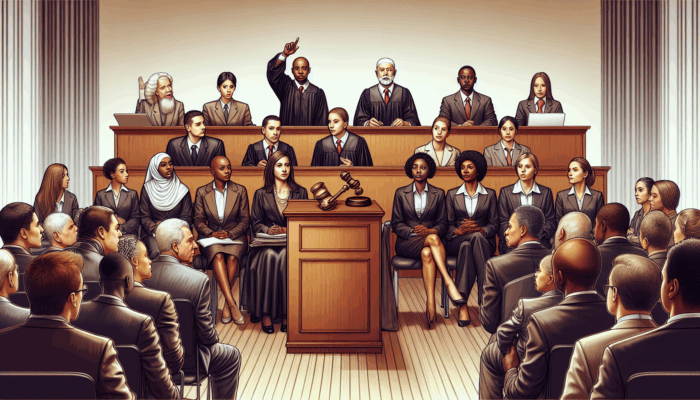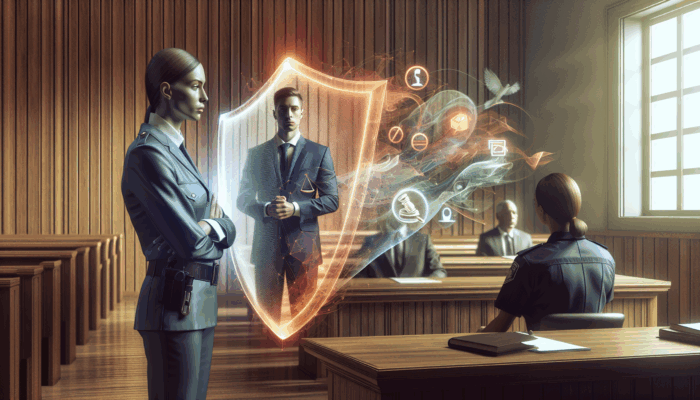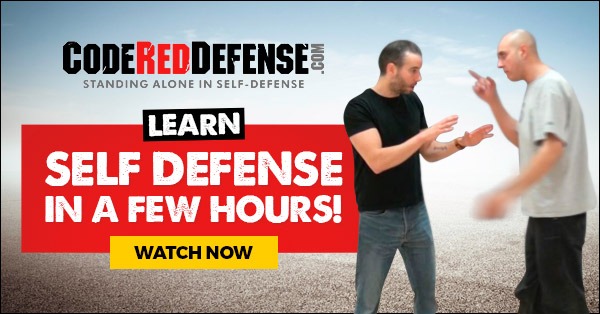Empowering Yourself: Know Your Legal Rights
Understanding your legal rights is a critical shield in challenging situations, particularly when communicating with law enforcement after a self-defense incident. Knowledge of your rights can drastically alter the outcome of emotionally charged encounters with police. From the right to remain silent to the right to legal representation, these rights are foundational elements of your defense strategy, empowering you to confidently navigate the complexities of the legal system while protecting your interests.
Exercise Your Right to Remain Silent

The right to remain silent is a fundamental protection granted to individuals in the United States, often highlighted in the well-known Miranda warning. This right permits you to abstain from answering questions that could inadvertently lead to self-incrimination. Consider a scenario where you’ve had self-defense; the adrenaline rush can cloud your judgment and clarity of thought. By exercising your right to remain silent, you avoid making statements that could be misinterpreted or later used against you in court proceedings.
Utilizing this right is not an admission of guilt; instead, it acknowledges that encounters with law enforcement can be emotionally taxing and disorienting. If approached by police, it is appropriate to state, “I wish to consult my attorney before responding to any questions.” This simple phrase gives you the necessary time and space to seek legal counsel. This choice can dramatically shape the direction of your case.
Moreover, grasping the significance of this right entails being aware of the risks associated with speaking too freely. Once you make a statement to law enforcement, it becomes part of the official record, and the prosecution can exploit any inconsistencies. Thus, when to remain silent can be a powerful component of your self-defense strategy, ensuring that your legal rights are preserved.
Secure Your Right to Legal Representation
The right to legal representation is another cornerstone of your legal protection. This right guarantees that you can access an attorney at any point during police questioning. Following a self-defense incident, emotions can run high, impacting your clarity of thought and decision-making. Having an attorney present can facilitate effective communication with law enforcement while upholding your legal rights.
When you request a lawyer, you send a message to law enforcement that you are serious about safeguarding your interests. This action can shift the dynamics of interaction and encourage officers to be more cautious regarding your rights and responsibilities. A skilled attorney is invaluable in guiding you through the process, advising you on what to say and how to ensure that every statement you make serves your best interests.
Furthermore, legal representation is especially crucial in self-defense cases, where the intricacies of the law can be challenging to navigate. An attorney can help you understand the specific self-defense laws applicable in your state, clarifying what constitutes acceptable use of force. They will advocate on your behalf, ensuring your perspective is accurately represented and you receive fair treatment throughout the legal process.
Understanding Your Miranda Rights
Miranda rights serve as a safeguard to inform individuals of their rights upon arrest or during custodial questioning. Before police can interrogate you, they are legally required to inform you of your rights. Familiarizing yourself with your Miranda rights is essential, particularly when discussing incidents with law enforcement following a self-defense situation.
When officers recite your rights, they typically state, “You have the right to remain silent. Anything you say can and will be used against you in court. This reminder reminds you that understanding these rights enables you to make informed choices during interactions with police. If you have not been notified of your beforerior to being, any statements you provide could be ruled inadmissible in court.
You should know that you can assert your rights anytime during an interaction. If you feel overwhelmed or uncertain, you can invoke your right to remain silent or request an attorney, regardless of whether the officers have formally recited your rights. This practice protects your interests and strengthens your case should it proceed to trial.
Guaranteeing Your Right to a Fair Trial

The right to a fair trial is a fundamental principle that secures the justice system. This includes the entitlement to an impartial jury, the opportunity to confront witnesses, and the ability to present your defense robustly. When it comes to communicating with law enforcement after a self-defense incident, understanding this right is essential to ensuring that you receive a fair assessment of your case.
A fair trial implies that the legal process must be transparent and just, without undue influence. If you suspect your rights are being compromised at any stage of the legal proceedings, you must voice these concerns to your attorney. They can advocate on your behalf, ensuring that all evidence and testimonies are evaluated fairly and accurately.
In addition to your right to an impartial jury, you also have the right to confront witnesses. This allows you to question those who testify against you, enabling you to challenge the evidence presented. This aspect of your trial is particularly significant if you are facing allegations stemming from a self-defense incident, where narratives can often be subjective. A competent attorney will ensure that your perspective is heard and understood within the courtroom.
Importance of Legal Representation
Your right to legal representation is not merely a formality but a vital element in ensuring your rights are protected throughout the legal process. Engaging a lawyer from the beginning can profoundly influence the outcome of your case, particularly in the emotionally charged aftermath of a self-defense incident.
Legal representation equips you with an advocate who comprehends the law’s complexities and can navigate your situation. Your attorney can help you devise strategies, prepare for police interviews, and formulate a compelling defense grounded in the specific self-defense laws applicable in your state.
Moreover, having legal counsel ensures that you are not alone during one of the most challenging experiences of your life. They can shield you from potential pitfalls, offer guidance on what information to disclose, and prepare you for future legal proceedings. Knowing you have an expert on your side can provide invaluable peace of mind as you navigate the aftermath of a self-defense incident.
As you reflect on your rights, remember that they are designed to empower you during distressing times. Understanding and exercising these rights can significantly impact your legal journey, especially when communicating with law enforcement after a self-defense incident.
Critical Steps to Take Immediately After a Self-Defense Incident
What you do right after a self-defense incident can have lasting implications for your legal situation. The moments following a confrontation are critical for establishing a strong foundation for your defense. Let’s examine the key actions you should take to ensure your safety and protect your interests.
Immediately Call 911
The first and most crucial step after a self-defense incident is to dial 911. Reporting the incident right away prompts a swift response from law enforcement and documents your account of the events. This action is essential for establishing a timeline and creating an official record of what transpired.
When making the call, remain calm and concise. Provide the dispatcher with vital information, including your location, a brief description of the incident, and any immediate dangers that may still exist. It’s essential to convey urgency without overwhelming the operator with unnecessary details. Remember, police officers will rely on the information relayed to them by the dispatcher upon arrival at the Scene.
As a scene, your call creates a documented account of your perspective on the incident. This record can be invaluable in future legal proceedings, particularly if there are inconsistencies between your version of events and that of the other party involved. By promptly informing law enforcement of the situation, you establish a foundation for your defense that will utilize this official report to your advantage.
Safeguard the Scene
Protecting the Scene of a self-defense incident is of the utmost importance. Avoid touching or moving anything at the location, as this can compromise evidence crucial to your case. It can be tempting to rearrange or clean up after a traumatic event, but doing so may inadvertently lead to accusations of tampering with evidence.
Allowing law enforcement to assess the Scene helps maintain the integrity of any physical evidence. This includes everything from the positioning of objects to potential witnesses who may have observed the incident. Moving items around can alter the narrative of what occurred and may ultimately be used against you in court.
If it is safe to do so, remain at the Scene until the police arrive. This may feel uncomfortable, especially in a chaotic situation, but it is vital for ensuring that the facts are accurately represented. Once officers arrive, they will document the Scene, which can strengthen your account of self-defense when reviewed by legal professionals.
Thoroughly Document the Incident
Taking the time to document the incident immediately after it occurs can significantly improve your defense. Capture photos or videos of the Scene, injuries you sustained, and any damage during the confrontation. Documenting these details can serve as robust evidence in court, supporting your version of events.
As soon as possible, write down your recollections of the events, including details such as the time, place, and sequence of what transpired in your own words. This documentation becomes a critical piece of evidence that can clarify any ambiguities that may arise later. Given that thoughts can cloud memory, capturing your thoughts immediately is essential for maintaining an accurate account.
If witnesses are present, try to gather their contact information. Eyewitness accounts can provide additional support for your narrative, especially if they corroborate your claim of self-defense. A comprehensive documentation is a solid foundation for your case, making it easier for your attorney to construct a compelling defense.
Engaging with Law Enforcement Effectively
Navigating interactions with law enforcement following a self-defense incident requires a careful balance of cooperation and a solid understanding of your rights. Here’s how to communicate effectively with officers while protecting your interests.
Maintain a Polite and Cooperative Attitude
When law enforcement arrives at the Scene, it is crucial to maintain a polite and cooperative demeanor. Officers are trained to assess situations and de-escalate tensions, and your calmness can significantly influence how the encounter unfolds. While being cooperative is essential, remember that this does not mean relinquishing your rights.
Start by introducing yourself and expressing your willingness to cooperate. However, remain vigilant about your rights; you can be courteous without divulging every detail of the incident. Officers may pose harmless questions, but an inquiry can affect your case. A simple statement, such as “I would prefer to wait for the attorney before discussing the details,” effectively communicates that you are open to engaging but prioritize your rights.
Furthermore, your demeanor can shape how officers perceive you. Approaching the situation calmly may help foster a more favorable impression, which could be beneficial if uncertainties arise later. This interaction can set the tone for how your case is perceived and may influence the officers’ opinions in court.
Provide Basic Information Only
While cooperation is essential, it is equally important to understand what information to provide. You are obligated to share your name and address, but you should refrain from making detailed statements about the incident until you have legal counsel present. This careful approach safeguards your interests while still adhering to the law.
When giving basic information, keep your responses brief and focused. Avoid discussing the specifics of the confrontation, as anything you say can potentially be used against you later. Instead, concentrate on factual details unrelated to the incident itself. For instance, you might state, “I was involved in the confrontation, and I believe it was self-defense, but I would like to wait for my attorney before discussing it further.”
Remember, he aims to provide officers with sufficient information to identify and understand your involvement in the situation without compromising your defense. This careful navigation of the conversation will allow you to maintain control over your narrative and protect your rights.
Request Legal Representation
If you feel uncomfortable or uncertain during your interaction with law enforcement, do not hesitate to ask for a lawyer. This is not only your right but also a prudent choice to protect yourself as you navigate the complexities of a self-defense case. The presence of legal counsel can significantly change the nature of your conversation with police.
By requesting a lawyer, you indicate that you recognize the seriousness of the situation and are committed to protecting your rights. Officers are legally obliged to respect your request, allowing you to pause questioning until you consult with your attorney. Your lawyer will provide guidance and respond to inquiries, ensuring your rights remain safeguarded.
Additionally, having a lawyer present can help you avoid common pitfalls that individuals often encounter when interacting with law enforcement. Your attorney can advise you on what information to disclose and how to articulate your experience without jeopardizing your case. Ultimately, having legal representation can profoundly impact the outcome of your situation.
Be Aware of Your Rights
Familiarizing yourself with your legal rights is crucial for protecting yourself during encounters with law enforcement. Understanding your rights, including the right to remain silent and the right to an attorney, empowers you to navigate the complexities of any engagement with confidence.
For instance, if police officers begin questioning you about the incident, being aware of your right to remain silent allows you to respond confidently and assertively. You might say, “I do not wish to ask any questions without my attorney present.” This assertion protects your interests but establishes clear conversation boundaries.
Moreover, being well-versed in your rights helps you recognize when they may be violated. If officers attempt to pressure you into making statements or admissions, asserting your rights becomes even more critical. Always remember that exercising your rights is not an admission of guilt; rather, it is an intelligent decision to protect yourself in a vulnerable situation.
Lastly, don’t hesitate to seek help if you feel uncertain during the interaction. If an officer explains something you don’t understand, asking to understand can help you grasp the situation, enabling you to respond appropriately while safeguarding your rights during the encounter.
Documenting the Interaction
Whenever possible, documenting your interaction with law enforcement during a self-defense incident is a smart strategy. Keeping a record can serve as a valuable reference point, ensuring that you have an accurate account of what transpired and how the officers conducted themselves during the encounter.
One effective way to document the interaction is by taking notes. If you have access to a phone or a notepad, jot down key details such as the names of the officers you spoke with, the questions they asked, and your responses. This information can be instrumental for your attorney later, especially if discrepancies arise between your account and the officers’ accounts. If comfortable doing so, you might also consider recording the interaction, as long as it is legal in your state. A recording can provide an unaltered account of the conversation, which can be invaluable if issues emerge later in the legal process. However, ensure you understand your state’s laws regarding recording conversations with law enforcement to avoid legal repercussions.
Ultimately, documenting the interaction adds another layer of protection for your rights, ensuring that you have a clear representation of what occurred. This proactive approach can help you and your attorney build a compelling case as you navigate the aftermath of a self-defense incident.
Legal Considerations for Self-Defense
Understanding the legal landscape of self-defense is crucial for anyone in such a situation. The laws governing self-defense can vary widely from state to state, making it essential to familiarize yourself with the specific regulations that apply to your case.
Understanding Self-Defense Laws
Self-defense laws differ significantly across the United States, and knowing the intricacies of these laws in your state is vital for your defense. Most states permit individuals to use reasonable force to protect themselves from imminent harm; however, the definition of “reasonable” can vary depending on local statutes.
In many jurisdictions, self-defense is justified only if there is a genuine belief that you are a credible threat. If you have a safe opportunity to retreat, you are often legally required to do so rather than using force. However, some states have adopted “stand ur ground” laws, which allow individuals to use force without a duty to retreat. Understanding whether your state has such laws and how they apply to your situation can significantly influence the outcome of your case.
Furthermore, determining whether your actions were justified often hinges on the circumstances surrounding the incident. Factors such as the level of threat leveled by the other party, your response to that threat, and any prior history with the individual can all impact the legal assessment of your self-defense claim.
This is why seeking legal counsel from an attorney specializing in self-defense cases is critical. They can help you understand the specific laws in your state and guide you in constructing a solid defense based on those regulations.
Evaluating Use of Force
Understanding the distinction between reasonable and excessive force is paramount when evaluating one’s actions during a self-defense incident. Use-of-force laws are designed to protect individuals who respond to threats, but can also impose significant penalties for those who exceed appropriate boundaries.
Reasonable force is the minimum physical force necessary to protect oneself from harm. For example, if someone is verbally threatening you but not physically attacking, using lethal force would likely be deemed excessive. Conversely, if faced with an imminent and severe threat, such as an individual wielding a weapon, using physical force to defend yourself may be justified.
Excessive force can lead to criminal charges and civil liability. If law enforcement determines that your response was disproportionate to the threat, you could face serious legal consequences. This underscores the importance of understanding the self-defense framework; knowing what constitutes reasonable force in your jurisdiction can help ensure your actions are justified.
Discussing these distinctions with your attorney is essential, as they can guide you in articulating effectively should your case proceed to trial. The more you understand the limits of acceptable force, the better prepared you will be to defend your actions if they come under scrutiny.
Navigating the Duty to Retreat
In certain states, a legal concept known as the duty to retreat requires individuals to attempt to escape or avoid confrontation before resorting to force. This duty aims to promote de-escalation and prioritize non-violent resolutions to conflicts. Understanding whether your state imposes a duty to retreat is crucial, especially if you are involved in a self-defense situation.
If your state must enforce the law, it is vital to consider your options before resorting to force. If there was a clear opportunity for you to withdraw safely from the situation, failing to do so could weaken your self-defense claim. In such instances, law enforcement may argue that you had alternatives that would have prevented the need for force.
Conversely, if your state adheres to “stand ur ground,” you’re obligated to retreat before using force in self-defense; however, even in “stand y “ur ground” situations, the justification for using force must still align with the standards of reasonable force. Consulting with your attorney can clarify the implications of these laws and help you navigate your case effectively.
Being informed about the duty to retreat can significantly influence your actions during a confrontation and the legal interpretation of those actions afterward. This awareness allows you to make informed decisions that can enhance your self-defense claim.
Understanding Stand Your Ground Laws
Stand your ground laws are increasingly prevalent across various states in the U.S., empowering individuals to use force in self-defense without the obligation to retreat. Understanding how these laws apply in your jurisdiction is essential for anyone involved in a self-defense incident.
In states with stand your ground laws, you have the legal right to defend yourself without the requirement to escape a threatening situation. If you face an immediate threat, you can stand your ground and respond with reasonable force. However, it is crucial to recognize the boundaries of this law; the force you employ must still be proportionate to the threat you face.
Stand your ground laws can protect people who genuinely believe they are in danger. However, these laws can also be misinterpreted or misapplied. In cases where individuals resort to violence without just cause, these laws may not shield them from legal repercussions. Therefore, consulting an attorney who thoroughly understands your state’s underlying provisions is essential.
These laws can influence how law enforcement and the prosecution approach your case. Understanding the implications of stand your ground laws in your state enables you to navigate the legal landscape effectively, ensuring you are prepared should your case go to trial.
Avoiding Common Pitfalls After a Self-Defense Incident
Navigating the aftermath of a self-defense incident can be filled with potential missteps. Recognizing common mistakes can help you safeguard your interests and strengthen your defense as you engage with law enforcement and the legal system.
Avoid Over-sharing Information
One significant error after a self-defense incident is oversharing information with law enforcement. While providing a detailed account of what occurred may be tempting, doing so without legal counsel present can lead to unintended consequences. Every statement you make is subject to scrutiny and may deviate from your intended narrative.
When questioned by officers, it is crucial to maintain control over the information you disclose. Providing a concise summary of events is appropriate, but delving into extensive detail may expose you to inconsistencies that could undermine your case. If officers request elaboration, responding with “I would like to speak to my attorney first is entirely acceptable.”
This approach protects your rights and helps ensure your narrative remains consistent and aligned with your defense strategy. Documenting your statement carefully, ideally with legal counsel present, is the best way to ensure that your account of events is clear, accurate, and precise. Do not alter Scene. A mistake to avoid is changing the Scene of the incident. After a self-defense event, moving or touching items involved in the confrontation can be instinctual. However, doing so can compromise critical pieces of evidence that could support your case. Even seemingly minor changes can lead to accusations of tampering with evidence, which can significantly impact your standing.
It’s essential to allow law enforcement to assess it as it is. This means stepping back and refraining from any actions that could detract from the integrity of the physical evidence. Preserving everything in its original place allows officers to depict what occurred accurately, which can be pivotal in your defense.
Suppose you must move for safety reasons (for instance, if there’s a threat), document the Scene thoroughly before doing so. Photos or videos can provide valuable evidence, ensuring your account remains intact and supported.
Never Ignore Your Rights
Failing to assert your rights is one of the most detrimental mistakes you can make following a self-defense incident. Ignoring your right to remain silent or your right to legal representation can have severe repercussions for your case. If you do not assert these rights, you risk providing statements that could be utilized against you in court.
Understanding the significance of your rights empowers you to navigate interactions with law enforcement confidently. If you feel pressured to answer questions or provide details, politely remind officers of your rights. Saying something like, “I’d like to exercise my right to remain silent until I can speak with my attorney,” is both assertive and protective. Resting aware of your rights, you protect yourself in a highly stressful and emotionally charged encounter. Consulting with an attorney as soon as possible will reinforce your understanding of your rights and how to assert them effectively.
Preparing for Police Interviews Effectively
Preparing for interviews with law enforcement following a self-defense incident is essential for your defense. Understanding how to approach these interviews can significantly impact the outcome of your case.
Review Your Statement Thoroughly
If you must provide a statement to law enforcement, carefully reviewing it beforehand is crucial. This step ensures that your account is accurate and consistent with your recollections of events. A recollection can bolster your case, while inconsistencies may lead to misunderstandings or misinterpretations.
Before the interview, take the time to jot down all the details you remember about the incident. This includes the sequence of events, the people involved, and any actions you took in response to the threat. Reviewing this information can help you articulate your story effectively during the interview, reducing the likelihood of confusion or errors.
Additionally, don’t hesitate to discuss your statement with your attorney beforehand. They can provide valuable insights into how to frame your narrative and which details may be most critical to emphasize. This collaborative preparation enhances your ability to present a compelling account of your self-defense experience.
Ensure Legal Representation is Present
Legal representation in interviews with law enforcement is one of the most effective ways to protect your rights. An attorney can guide you through the process, assist you in navigating questions, and ensure that your responses align with your defense strategy.
Your lawyer will serve as your advocate, addressing any concerns during the interview and providing real-time advice on engaging with officers. If questions become unclear or uncomfortable, your attorney can intervene to ensure you don’t inadvertently compromise your case.
Moreover, having legal counsel present can foster confidence. Knowing you have an expert in your corner lets you focus on your account without the added stress of navigating the situation alone. This collaboration can prove invaluable, especially in emotionally charged situations where clarity and composure are essential.
Maintain Calmness and Focus
Staying calm and focused during police interviews is paramount. Emotions can easily cloud judgment and lead to miscommunication. Before entering the interview room, take a moment to breathe and center yourself. Remind yourself of your rights and the importance of conveying your story clearly.
When answering restaurant questions, take your time. There is no need to rush. If you require a moment to gather your thoughts before responding, it’s acceptable. This can help prevent you from providing hasty or unclear responses that could be misinterpreted.
Additionally, focus on the facts. Avoid embellishing details or speculating about the intentions of others involved in the incident. Clear, factual responses bolster your credibility and ensure that your account remains focused on the essential elements of the event. Maintaining a calm and composed demeanor lays the groundwork for a more favorable outcome in your case.
Navigating the Aftermath of a Police Interview
The period following a police interview can be just as crucial as the interview itself. Knowing how to navigate this phase is vital for protecting your interests and preparing for the next steps in your legal journey.
Follow Up with Your Attorney Promptly
After your police interview, one of the first actions you should take is to follow up with your attorney. Discussing the interview allows you to gain insights into how the questioning unfolded and what potential implications it may have for your case. Your lawyer can help you evaluate the situation and determine the next steps.
This follow-up discussion also provides an opportunity to address any concerns or questions you may have about the interview process. Your attorney can clarify any aspects of the law that may be confusing and help you understand how the statements made during the interview might influence your case moving forward.
Additionally, your lawyer can begin preparing for any subsequent legal proceedings based on the information gathered during the interview. This proactive approach ensures you remain informed and ready for whatever comes next in your legal journey.
Document Any New Information Immediately
If you remember additional details about the incident after your police interview, it’s vital to document this information as soon as possible. Memory can be fickle, and new recollections may surface in the days following the interview. The sooner you capture these details, the more likely they are to remain clear and accurate.
Share this new information with your attorney, as they can assess its relevance to your case. It may be instrumental in building a stronger defense if it adds another layer to your self-defense claim or helps clarify any ambiguities.
Moreover, documenting anything new can serve as a reference point for future discussions, whether with your attorney or during court proceedings. Keeping a detailed account of your thoughts and recollections allows you to present a comprehensive narrative, reinforcing the credibility of your self-defense claim.
Prepare for Further Investigations
Following your initial police interview, be prepared for potential follow-up inquiries. Law enforcement may have additional questions or seek to delve deeper into specific aspects of your case. Staying proactive and cooperative during this phase can significantly influence how your case unfolds.
Your attorney can guide you through any interactions with law enforcement, ensuring you remain protected while providing necessary information. They can also help you understand what to expect during this phase and how to prepare for any additional questioning.
Recognizing that an ongoing investigation may occur helps you mentally and emotionally prepare for what lies ahead. You should maintain your composure and focus on the facts, ensuring that your interactions with police remain consistent with your self-defense narrative.
Frequently Asked Questions
What are the immediate actions I should take after a self-defense incident?
It is crucial to call 911 to report the incident, secure the Scene without altering any evidence, and document your recollections of events as soon as possible.
Can I refuse to answer police questions after a self-defense incident?
Yes, you have the right to remain silent and can request a lawyer to answer any detailed questions from law enforcement.
What rights do I have during a police interview?
You possess the right to remain silent, the right to an attorney, the right to a fair trial, and the right to legal representation throughout the entire process.
What distinguishes reasonable from excessive force?
Reasonable force is the minimum necessary to protect yourself from harm, while excessive force exceeds what is needed and may require severe consequences.
What does the ‘duty to ‘t’
‘Reat-to-restrain mandates that individuals attempt to escape or avoid confrontation before using force, unless they are in a state with stand-your-ground laws.
What are stand-your-ground laws?
Stand your ground laws allow individuals to use force in self-defense without a duty to retreat, provided that using force is reasonable given the threat faced.
Is it necessary to have a lawyer present during police interviews?
Yes, having legal representation during police interviews is vital for protecting your rights and ensuring that your statements align with your defense strategy.
What should I avoid saying during police questioning?
Avoid providing detailed accounts of the incident without legal counsel, making assumptions about the intentions of others, or speaking in a way that could confuse or contradict your narrative.
How can I effectively prepare for a police interview post-self-defense?
Review your statement, maintain calmness and focus, and ensure your lawyer is present to guide you through the process and protect your interests.
What if I remember new information after my police interview?
Document any new details as soon as possible and share them with your attorney, as they may be relevant to your case and can strengthen your defense.





What a wonderfully enlightening piece! It’s interesting how legal rights can feel like a hidden treasure map in the adventure of navigating the legal system. You’d think knowing your rights would be as intuitive as knowing not to pet the grizzly bear at the zoo, but alas, many of us are left feeling perplexed—especially in those tense moments.
You’ve captured a critical aspect of the legal landscape right there. Navigating the legal system often feels like an expedition through a dense forest, where the paths are unclear and the potential pitfalls are lurking everywhere. It’s such a surreal experience that knowing your rights could save you from a lot of trouble—but when push comes to shove, those rights can feel as elusive as gold at the end of a rainbow.
“Thanks for your thoughtful insights! If you’re looking to uncover more of those hidden treasures within the legal system, check out this resource that can guide you through your rights with clarity and confidence.”
https://justincasegear.com/CodeRedDefense
I love your analogy about the hidden treasure map—that really captures the essence of how many folks feel when they dive into legal matters. It’s surprising how often the rights that are supposed to protect us can feel more like a maze than a clear pathway. In those moments of stress, when you really need to access those rights, it can feel like they’re just out of reach, much like trying to find that one clue on a complicated scavenger hunt.
“I’m glad you found the piece enlightening! If you’re looking to navigate that treasure map of rights with more confidence, check out this resource that can help shed light on the legal landscape.”
https://justincasegear.com/CodeRedDefense
Wow, you’ve really hit the nail on the head with the emphasis on knowing our rights! I remember this one time at a company event where we had a workshop on just that—everyone got a crash course in legal jargon, and I felt like I was one step closer to passing the bar exam (or at least winning a game of “Lawyer Says”).
It sounds like that workshop made quite an impression! Knowing our rights can be such a game changer, especially in today’s workplace. It’s interesting how diving into legal jargon can feel a bit like deciphering a secret code. The more we learn, the more empowered we become, whether it’s for our own benefit or to support our colleagues.
I’m so glad you found the emphasis on knowing our rights valuable! If you’d like to dive even deeper into legal insights and sharpen those skills, check out this resource I found—it’s like a mini law school for everyone!
https://justincasegear.com/GuerillaHomeDefense
Your exploration of legal rights, particularly in the context of self-defense incidents, is both timely and essential. Understanding the legal landscape we navigate can genuinely empower individuals facing distressing situations, especially when interacting with law enforcement. It’s crucial to remember that the adrenaline and stress accompanying such scenarios can severely impact one’s ability to respond effectively. For instance, many people may not realize that their initial reactions and responses can have lasting consequences, both legally and emotionally.
You raise such a crucial point about adrenaline and stress affecting our responses in high-pressure situations. I’ve often thought about how those emotions can distort our perception of reality and influence our actions. It’s not just legal outcomes at stake; it really can shape our emotional well-being for a long time afterward.
You’ve touched on something really important about how adrenaline and stress can warp our perception. It’s almost like our brain hits a reset button in those high-pressure moments, which can make it tough to see things clearly. I think about how often we react in the heat of the moment, and later find ourselves reflecting on those choices, sometimes with a mix of regret or confusion.
This is such an important topic, especially in today’s climate where interactions with law enforcement can be highly charged and emotional. The concept of knowing your legal rights, particularly the right to remain silent, is crucial. I remember a friend sharing a story about a situation where they felt overwhelmed after an incident and spoke without considering how their words could impact them legally. It’s a stark reminder of how vital it is to pause, take a breath, and fully understand the implications of our words.
This post really highlights an essential aspect of navigating our legal rights, especially in emotionally charged situations like self-defense encounters. I can’t help but reflect on how critical it is to understand not just the legal language around these rights, but also the practical implications. For instance, I once attended a workshop on conflict resolution that emphasized the importance of having a clear Mindset in stressful situations. We practiced scenarios where the “right to remain silent” became a lifeline rather than a burden, allowing individuals to pause and think before responding.